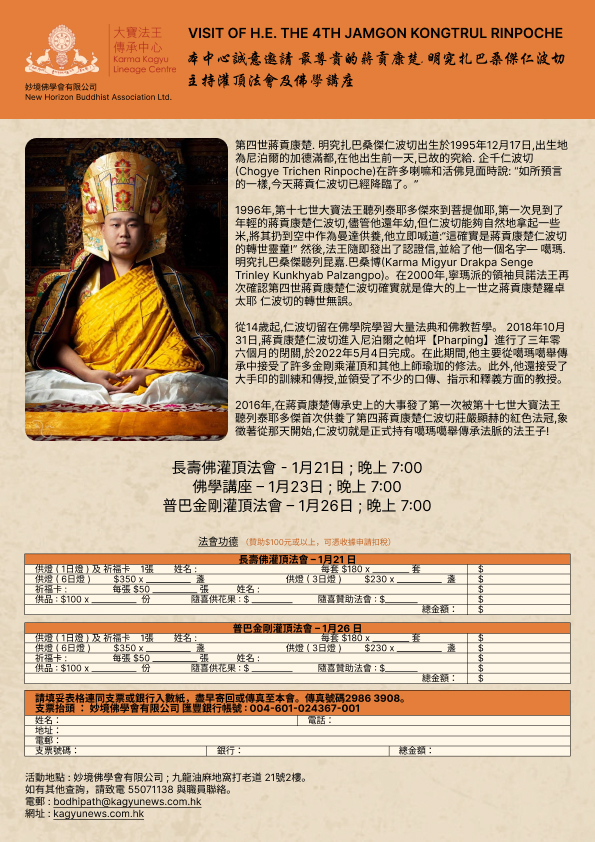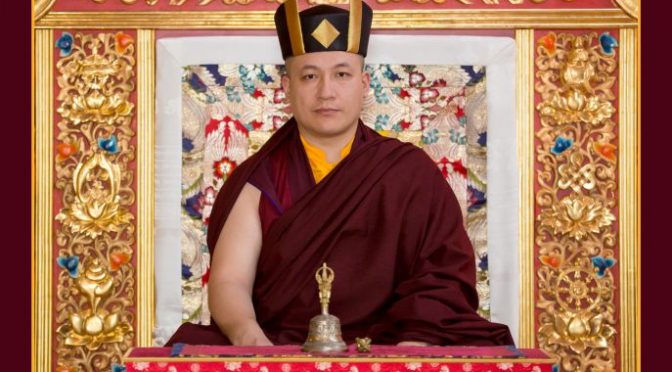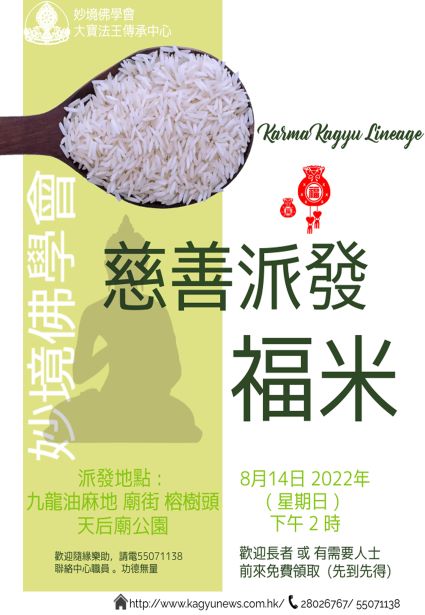February 10,2023
第十七世大寶法王嘉華噶瑪巴泰耶多傑,於敘利亞和土耳其邊境最近發生地震後發出的哀悼信息
親愛的法友
上週一土耳其和敘利亞邊境地區發生毀滅性地震後,我一直懷著最深切的悲痛關注事態的發展。
在我寫下這些文字的時候,死亡人數已經上升到兩萬一千以上,受傷的人數更是數以萬計,更不用說那些無家可歸和失去基本生活物資的人了。
言語無法表達我們對那些正在經歷這種災難的人的感受,面對這樣的苦難,即使是祈禱也似乎顯得無力。
唯一能記起的是,生命真的很脆弱。 令人遺憾的是,似乎只有如此震撼人心的悲劇才能喚醒我們對無常的覺受。
然而,這可能是一個機會,讓我們認識到無常這個事實,而且以一種特別的方式,我們可以在無常中找到慰藉。無常向我們清楚說明,由一開始我們從來沒有人在這裡,因此沒有人真正死亡,原因是沒有人真正在這裡會死去。
我們往往認為我們失去的親人“去了”一個不知名的地方,而我們“還活著”在一處跟他們不一樣的地方,因此我們感到分離、相隔和被困。
我覺得無常是生命其中的一面,透過我們自身,向我們闡明了一個事實,試圖挽回我們失去的東西和我們必須忍受失去的痛苦都是徒勞的。
我覺得生命通過無常在喚醒我們,教育我們“失去”這個詞或“分離”想法,都只是一個字、一個想法而已,沒有別的。
所以請嘗試找一種方法,讓我們不僅知道,而且要感覺到我們只是被文字、想法和概念而分開。
概念確實象徵著在一起、活著、相互聯繫,那是它美麗之處。
然而,沒有人真正活著,存在,徘徊在“這裡”。 沒有人真正死去、失去、消失在“那裡”。
“這裡”和“那裡”都只是我們人類的觀念。 以這種方式表達並沒有錯,這正是我們所做的。
然而,作為人類也代表有勇氣去理解,不能要求我們的觀念能帶我們所愛的人回來,倒帶回到過去或糾結於“假如”。我們必須放下所愛的人和失去他們這種觀念。
與其哭泣和乞求我們的觀念可以讓事情回到原來的樣子,我們必須找到一種方法打破觀念,並珍惜觀念給過我們的東西,它們為我們帶來的所有美好回憶。
通過這種方式,我們可以明白,如果我們感到分離,那只是一種表達,表達我們永遠不想分離以及我們希望永不分離。
但我們不必相信我們真的分開了,因為沒有觀念的存在,從一開始我們就不會分開。
然而,作為人類,我們有這個奢侈,仍然有機會說“我愛你”。 即使我們從未分開過,我們仍可以奢侈地說“我不想和你分開”。
例如,當我們要求某人為我們祈禱時,祈禱根本從來不缺少,儘管如此,我們仍然提出願望。 在某種程度上,這就是它美妙之處。
就是這樣,概念幫了我們很多,因為沒有概念,我們永遠不會知道我們有多愛彼此。 事實是,在我們有概念之前,我們一直彼此相愛,但正是這些概念幫助我們理解到這些事實。
生活各方面都是如此,不幸的是,我們只有被巨大的悲劇所震撼時才會意識到這一點,而生活中的小事、小細節並沒有動搖或喚醒我們。
因此,我們現在經歷的分離是概念的另一種幫助,讓我們有機會認識到我們從未真正分開過。
簡而言之,我想傳達的是,欣賞你的概念,但不要乞求它們把事情帶回原來的樣子,不要要求它們倒帶。 不要錯用概念試圖找出誰對你的痛苦來負責,不要用它來指責。
如果我們以這種方式誤用概念,試圖讓事情回到原來的樣子,或者加以指責,我們將得不到任何安慰或控制感,因為概念從來就不是這樣子。
像“我現在將如何生活?”這樣的想法,以及在這種時候出現的孤獨、害怕、迷失和分離的感覺,都是很自然的。當這些想法和情緒生起時,我們可以由它出現,因為它們只是以獨特的方式來真正表達“我希望我永遠不會分開,我非常想念你。”
因此,我們能找到的唯一慰藉或安慰是要理解到我們從未分開。
如果你記得你所愛的人的眼神,如果你記得他們的觸摸,尤其是在沒有言語的時刻,那麼這些記憶可以讓我們瞥見真相,就是我們從來不需要概念來明白愛一直都在那裡。
所以,我並不是要說你必須堅強,你必須活下去,你必須要勇敢,這樣的話就好像悲劇是真實的,好像你和你所愛的人真的分開了,你真的被遺棄和迷失了一樣 。
這樣,我們可以理解到概念只是在裝飾本來已經很漂亮的花朵。
我們不必試圖變得堅強,好像我們很虛弱一樣。 我們不必努力活著,好像我們正在死去一樣。 我們不必勇敢,好像我們缺乏勇氣一樣。 我們從來就不需要如此。
相反,我們可以簡單地珍惜和感激概念帶給我們所有的美好回憶。
而且,也讓我們跟概念說一聲衷心的“再見”,是它令我們明白到一直以來我們不曾分開。
致上祈禱
第十七世大寶法王嘉華噶瑪巴泰耶多傑
Thaye Dorje, His Holiness the 17th Gyalwa Karmapa, shares this message of condolence after the recent earthquake on the border of Syria and Turkey.
Dear Dharma friends,
It is with deep sorrow that I have been following the developments after the devastating earthquake that hit the border area between Turkey and Syria last Monday.
As I write these lines, the death toll has risen to over twenty-one thousand, and tens of thousands more have been injured, not to speak of all those who have become homeless, and have lost the very basis of their material existence.
Words don’t do justice to how one feels for those who are experiencing such calamity, and even prayers seem to feel weak in the face of such suffering.
The only thing that one can recall is that life is truly fragile; and it’s sad that only such potent tragedies seem to be able to wake us up to a genuine sense of impermanence.
However, this may be an opportunity to realise that impermanence is the reality and that, in a curious way, this impermanence is also the place where we can find solace: impermanence shows us that none of us were ever here in the first place, and that therefore no one truly perishes, as there is no one really here to perish.
We can’t help but feel that the loved ones we have lost are ‘gone’ to an unknown place, and that we are ‘alive’ on a different plane, and that therefore we feel separated, apart and stranded.
I feel that impermanence is one of the aspects of life that indicate to us – and in a way through us – that it is futile to attempt to bring back what we have lost, and that we must live with the pain of loss.
I feel that life is calling to us through impermanence, indicating that the word ‘lost’ or the thought of ‘separation’ is only that – a word, a thought – and nothing else.
So please try to find a way to not only know but feel that we are only separated by words, thoughts, and concepts.
Concepts do symbolise being together, being alive, being connected. That is their beauty.
However, no one is truly living, alive, lingering ‘here’. No one is truly dead and lost, gone ‘there’.
Being ‘here’ and ‘there’ are concepts only expressed by us humans. And there is nothing wrong with expressing ourselves the human way. That’s what we do.
Nevertheless, being human also means having the courage to understand that we can’t ask our concepts to bring back our loved ones, to rewind or to dwell on ‘what-ifs’.
We have to let go of the concepts of the loved ones and the concept of them being lost.
Instead of crying and begging our concepts to bring back things to the way they were, we must find a way to let the concepts go, and cherish what they gave us, all the beautiful memories they have provided us.
In this way we can come to realise that if we feel apart it’s only an expression: an expression of how we never want to be separate and how we wish to never be apart.
But we don’t have to believe that we are truly apart, because without concepts we were never apart to begin with.
Yet, it is our luxury as human beings that we have opportunities to say “I love you” still. We have the luxury of saying “I don’t want to be apart from you”, even though we have never been apart.
For example, when we ask somebody to pray for us, it is already a given that there will never be a shortage of prayer – nevertheless, we still formulate the wish. And in a way, that’s the beauty of it.
In this way, concepts have done so much for us, since without concepts we will never know how much we love each other. The reality is that we have always loved each other, way before we knew concepts, but it’s concepts that have helped us understand that very fact.
It’s the same for all aspects of life, and it’s unfortunate that we come to this realisation only when shaken by great tragedies, and that the small things, the small details in life didn’t manage to shake us or wake us.
And so therefore, the experience of being separated that we are getting now is yet another help from our concepts: the opportunity to realise that we are never truly apart.
In short, what I’m trying to convey is this: appreciate your concepts, but don’t beg them to bring back things to the way they were, don’t ask them to rewind. And don’t misuse concepts by trying to find who is responsible for your pain, don’t use them to cast blame.
If we misuse concepts in this way, by trying to bring back things to the way they were or by casting blame, we will not find any sense of solace or control, because concepts were never meant to do that.
It is natural for thoughts like “How will I live now?” and for feelings of being alone, afraid, lost and apart to arise at times like this. When these thoughts and emotions arise we can allow them, because they are just unique ways of really saying, “I wish I was never apart, and I miss you dearly”.
Therefore, the only solace or comfort we can find is in the understanding that we never were apart.
If you remember the looks from your loved ones’ eyes, if you remember their touches, especially during moments when no words were being said, then these memories can give us a glimpse of the truth: that we never really needed concepts to know that love was always there.
And in this way, we might come to realise that concepts were just decorating the already beautiful flowers.
And so, I’m not trying to say that you must be strong, you must live, you must be brave, as if the tragedy were real, as if you and your loved ones were truly apart and you were truly left behind and lost.
We don’t have to try to be strong, as if we were weak. We don’t have to try to live, as though we were dying. We don’t have to be brave, as if we lacked courage. We were never meant for any of that.
Instead, we can simply cherish and appreciate all the beautiful memories that our concepts have given us.
And say a heartfelt ‘fare well’ to the concepts for letting us realise that we were never apart in the first place.
With prayers
Thaye Dorje, His Holiness the 17th Gyalwa Karmapa
https://www.karmapa.org/karmapas-condolence-message-for-the-syria-earthquake/
(中文翻譯由本中心翻譯小組負責。若有錯漏,請見諒。節錄或載列文章內容以原文為準。)










